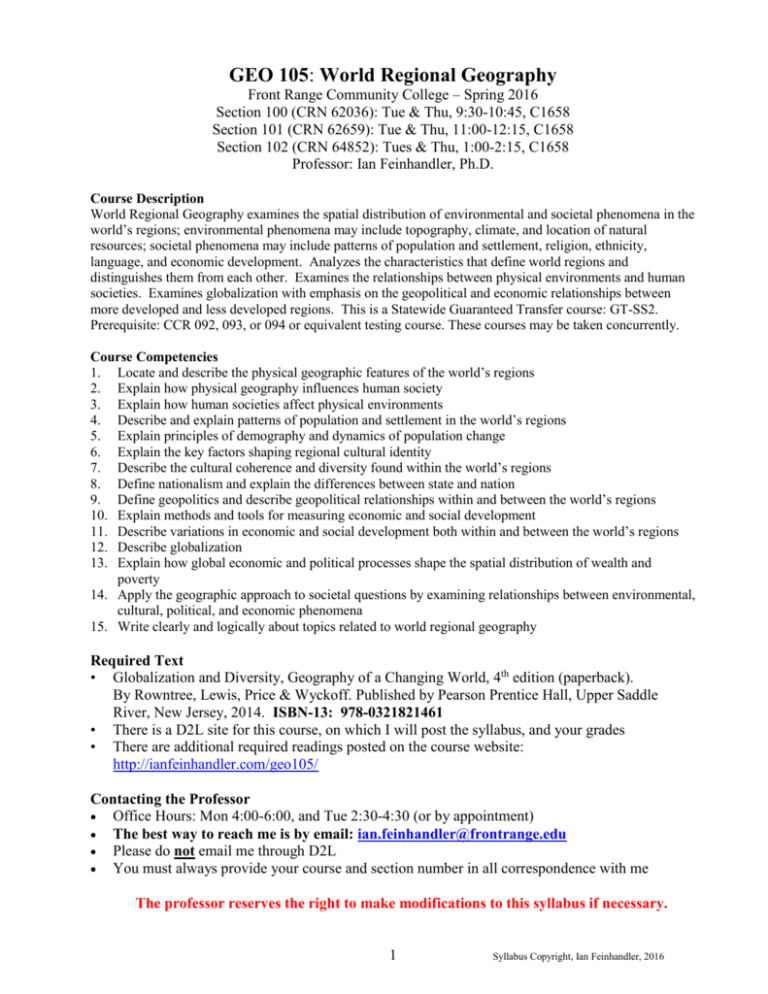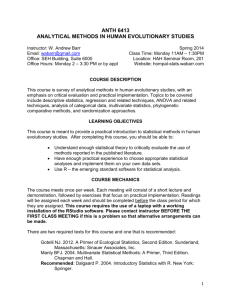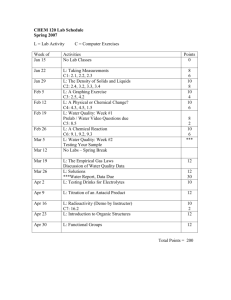
GEO 105: World Regional Geography
Front Range Community College – Spring 2016
Section 100 (CRN 62036): Tue & Thu, 9:30-10:45, C1658
Section 101 (CRN 62659): Tue & Thu, 11:00-12:15, C1658
Section 102 (CRN 64852): Tues & Thu, 1:00-2:15, C1658
Professor: Ian Feinhandler, Ph.D.
Course Description
World Regional Geography examines the spatial distribution of environmental and societal phenomena in the
world’s regions; environmental phenomena may include topography, climate, and location of natural
resources; societal phenomena may include patterns of population and settlement, religion, ethnicity,
language, and economic development. Analyzes the characteristics that define world regions and
distinguishes them from each other. Examines the relationships between physical environments and human
societies. Examines globalization with emphasis on the geopolitical and economic relationships between
more developed and less developed regions. This is a Statewide Guaranteed Transfer course: GT-SS2.
Prerequisite: CCR 092, 093, or 094 or equivalent testing course. These courses may be taken concurrently.
Course Competencies
1. Locate and describe the physical geographic features of the world’s regions
2. Explain how physical geography influences human society
3. Explain how human societies affect physical environments
4. Describe and explain patterns of population and settlement in the world’s regions
5. Explain principles of demography and dynamics of population change
6. Explain the key factors shaping regional cultural identity
7. Describe the cultural coherence and diversity found within the world’s regions
8. Define nationalism and explain the differences between state and nation
9. Define geopolitics and describe geopolitical relationships within and between the world’s regions
10. Explain methods and tools for measuring economic and social development
11. Describe variations in economic and social development both within and between the world’s regions
12. Describe globalization
13. Explain how global economic and political processes shape the spatial distribution of wealth and
poverty
14. Apply the geographic approach to societal questions by examining relationships between environmental,
cultural, political, and economic phenomena
15. Write clearly and logically about topics related to world regional geography
Required Text
• Globalization and Diversity, Geography of a Changing World, 4th edition (paperback).
By Rowntree, Lewis, Price & Wyckoff. Published by Pearson Prentice Hall, Upper Saddle
River, New Jersey, 2014. ISBN-13: 978-0321821461
• There is a D2L site for this course, on which I will post the syllabus, and your grades
• There are additional required readings posted on the course website:
http://ianfeinhandler.com/geo105/
Contacting the Professor
Office Hours: Mon 4:00-6:00, and Tue 2:30-4:30 (or by appointment)
The best way to reach me is by email: ian.feinhandler@frontrange.edu
Please do not email me through D2L
You must always provide your course and section number in all correspondence with me
The professor reserves the right to make modifications to this syllabus if necessary.
1
Syllabus Copyright, Ian Feinhandler, 2016
Course Requirements
Email: FRCC provides all students a free college e-mail account and uses this email as its primary form
of communication; it is essential that students activate their e-mail account and check e-mail regularly.
Activate your college e-mail account by logging into your student account in eWOLF. The use of
personal email accounts is not permitted, for either faculty or students. When you email your
professor always include your course and section number.
Attendance: attendance in this course is vital to your success; you will not be able to perform
well on the exams or papers without attending lectures. If you have three unexcused absences
your final grade in the class will be reduced by ten points (out of 100). For every additional
class you miss, your grade will be reduced by an additional ten points.
Late Arrival / Early Departure: arriving late to class or leaving class early disrupts the learning
environment; if you are late to class or leave class early three times your final grade in the class
will be reduced by five points (out of 100). For every additional late arrival or early departure,
your grade will be reduced by an additional five points, and you may be asked to withdraw from
the class for disrupting the learning environment.
Reading Quizzes: quizzes on course readings will be administered on D2L every week; material
tested will be the reading assigned for the week in which the quiz is given. Each week’s reading
quiz must be completed by Monday at 9:00pm unless otherwise noted on the syllabus. I will
drop your lowest quiz grade, but no make-ups will be given for missed quizzes.
Lecture Quizzes: there will be an unspecified number of pop-quizzes in class. These will occur
at the start of class, and will cover the previous lecture only. The quizzes will begin at the very
start of class; so as not to disturb students taking the quiz, the door will not be opened for late
arrivers, so if you are late to class you will miss the quiz.
In-Class Exams: there will be two in-class exams, each taking the full class period. Exams will
test lecture material only (unless otherwise specified). If you miss an exam with a documented
excuse you will be able to make-up the exam at the Testing Center within one week of the
original exam date. It is your responsibility to check Testing Center hours (303-678-3647). No
make-up exams will be given without a documented excuse.
Papers: there are a total of three papers in the class: Paper 1, Paper 2, and the International
Affairs (IA) Paper. Paper 1 and Paper 2 are focused on course material, while the IA Paper is a
response to an IA Lecture given outside of classroom hours. All students must attend a
minimum of one IA Lecture and write a response paper, so look at the schedule of IA Events on
the last page of this syllabus and make necessary scheduling plans. Complete instructions for
writing course papers are posted on the course website under the link “Papers.”
Course Grade
Your course grade will be calculated
as follows:
Reading Quizzes
Lecture Quizzes
Exam 1
Exam 2
Paper 1
Paper 2
IA Paper
Total
Final letter grades are assigned based
upon the points you earn in the class:
90-100
80-89
70-79
60-69
< 60
20
10
20
20
10
10
10
100
2
A
B
C
D
F
Syllabus Copyright, Ian Feinhandler, 2016
Academic Honesty: you must be honest in your academic work. No form of academic
dishonesty (as defined in the FRCC Student Code of Conduct) will be tolerated. As the course
professor, I will determine the severity of any incident of academic dishonesty; consequences
will range from a failing grade in the assignment to a failing grade in the course.
Student Code of Conduct
See the Student Handbook for a complete description of the Student Rights and Responsibilities and the
Student Code of Conduct. Conduct that violates the rights and freedoms of other students, faculty, staff or
the college community is subject to disciplinary action. Misconduct includes, but is not limited to, engaging
in any disruptive behavior which negatively affects or impedes the teacher’s ability to teach or, the student’s
ability to learn (regardless of the mode of educational delivery or class setting). Misconduct also includes
plagiarizing, cheating or helping someone else violate reasonable standards of academic behavior. Students
who engage in any type of academic dishonesty are subject to academic consequences as determined by the
instructor and disciplinary action as outlined in the Front Range Community College Disciplinary
procedures. Examples of Disrupting the Learning Environment include but are not limited to the following:
1. Late arrival or early departure from class
2. Use of electronic devices in class for purposes other than note-taking
3. Sleeping or eating in class
4. Dominating discussion or the instructor’s time (asking too many questions/talking too much)
5. Interrupting the instructor or other students
6. Children or other guests attending class without prior instructor approval
7. Attending class under the influence of alcohol or drugs
8. Lack of respect for others or the classroom community
Services
Tutoring: All students are eligible for free tutoring in two subjects for one hour per week if they are
earning a grade of 79% or below. Students fill out a tutor request form, available in the Student Success
Center (C1560) or online, get the instructor’s signature to verify their current grade, and submit it to the
tutoring office to be scheduled with a tutor. Students with disabilities receive two hours of tutoring per
week.
Special Services: If you have a documented disability (learning, physical, medical or psychological),
believe this condition impacts your learning and that you require academic accommodations, please
contact Disability Services (303-678-3922) to request an intake appointment.
Financial Aid Recipients: The following actions have eligibility implications for financial aid
recipients: non-attendance, dropping courses, repeating courses, academic progress, and the number of
credit hours attempted and completed. You are strongly encouraged to seek financial aid advising
throughout the term if you have any questions about eligibility implications.
College Policies
The policies below apply to 15-week classes. See the Spring 2016 Course Schedule for more details.
Tuition Payment Deadline (or Drop for Non-Payment Date): Students registered for courses prior to
this date are required to pay by Tuesday Jan. 12th. Students are notified via FRCC email when they are
dropped for non-payment, at which time they should go to Admissions & Records in Building A to
resolve the situation. For students registering after this date, payment is due by the end of the next
business day.
Classes Begin: The week starting on Tuesday Jan. 19th.
Last Day of Open Registration: Wednesday Jan. 20th.
Use of Add/Drop form Dates: Late registration for FRCC courses begins Thursday Jan. 21st and ends
Monday Jan. 25th. During this time, students must ask the instructor to approve adding the course,
signified by the instructor’s signature on a completed Add/Drop form. Late registration is at the
discretion of the instructor. The instructor should not add students to the course roster if the course is full
and should consider the order on the wait list when doing so. The signed form should be submitted to
Admissions and Records by 6:00 pm on the final day.
3
Syllabus Copyright, Ian Feinhandler, 2016
Drop for No-Show or Non-Attendance: Instructors will report a student’s attendance as 0 by Tuesday
Jan. 26th at 6:00 pm if the student has not attended class meetings. The student will be dropped from the
course for non-attendance the following day and will need to reregister for the course (using the Add/Drop
form or the Late Add Appeal form), if there remains room.
Use of Late Add Appeal form Dates: The Late Add Appeal period begins Tuesday Jan. 26th and ends
Tuesday Feb. 2nd. Late add appeals are rarely accepted. The Late Add Appeal form must be completely
filled-out by the student, completed by the instructor, signed by the Department Chair and lastly
submitted to Admissions and Records by 5:00 of the final day.
Last Day to Drop with Refund (AKA Census date): The last date to drop this course with a refund is
Wednesday Feb. 3rd, by 5:00pm.
Spring Break Dates: Monday March 21st to Sunday March 27th.
Withdrawal Date: The last date to withdrawal from this course is by 5:00 pm on Saturday April 16th.
Students who withdrawal between Wednesday Feb. 3rd and Saturday April 16th will receive a “W” on
their transcript for the course, and are not eligible for a refund. Students should visit with Financial Aid
prior to withdrawal to be fully informed of their options.
Classes End: Monday May 9th.
Grades are Due in eWolf: Thursday May 12th by noon.
Incomplete: To be eligible to receive an Incomplete grade, a student must have completed at least 75%
of all course assignments with a grade of “C” or better. The “Incomplete” grade is a temporary grade and
is designed for students who because of documented illness or circumstances beyond their control are
unable to complete the coursework within the semester. A grade of “Incomplete” can be assigned at the
discretion of the instructor. The Incomplete Grade form must be agreed upon and signed by both the
student and instructor then submitted to Admissions and Records.
Compliments? Issues? Complaints? Need help? Speak to your instructor first. If you have an issue that
cannot be resolved with your instructor, contact Department Chair: Spencer Morrison,
Spencer.Morrison@frontrange.edu
Campus Well Being
Our college is committed to preserving a safe and welcoming educational environment for all students. As
part of this effort, the instructor has an obligation to report certain issues relating to the health and safety of
campus community members. The instructor must report to the appropriate college officials any allegation of
discrimination or harassment. Sexual misconduct, which includes sexual harassment, non-consensual sexual
contact, non-consensual sexual intercourse, and sexual exploitation, is considered a form of discrimination.
In addition to reporting all discrimination and harassment claims, the instructor must report all allegations of
dating violence or domestic violence, child abuse or neglect, and/or credible threats of harm to yourself or
others. Such reports may trigger contact from a college official who will want to talk with you about the
incident that you have shared. In almost all cases, it will be your decision whether you wish to speak with
that individual. If you would like more information, you may reach the Title IX/EO Coordinator by emailing
Paul.Meese@frontrange.edu or calling 303-678-3707. Reports to law enforcement can be made with the
local law enforcement agency or you may contact the campus security office at:
Boulder County Campus – 303-678-3911
Larimer County Campus – 970-204-8124
Westminster Campus – 303-404-5411
If you would like a confidential resource, please contact Paul Meese, FRCC Executive Director of Human
Resources. Further information may be found on the college’s web site at: http://www.frontrange.edu/beinga-student/campus-safety.
GEO 105: Schedule of Reading Assignments, Papers, and Exams
Week 1
Jan 19
Jan 21
Jan 22
Lecture:
Lecture:
Reading:
Introduction
Globalization 1
Ch 1: Concepts of World Geography
4
Syllabus Copyright, Ian Feinhandler, 2016
Jan 25
Reading:
Jan 26
Jan 28
Lecture:
Lecture:
Feb 1
Reading:
Feb 2
Feb 4
Lecture:
Lecture:
Feb 8
Reading:
Feb 9
Feb 11
Lecture:
Lecture:
Feb 15
Reading:
Feb 16
Feb 18
Feb 18
Lecture:
Lecture:
Due:
Feb 22
Reading:
Feb 23
Feb 25
Lecture:
Lecture:
Web: Importance of Place
Web: Lost Empire
Web: Europe
Nationalism 1
Nationalism 2
Week 7
Feb 29
Mar 1
Mar 3
Reading:
Lecture:
Lecture:
Ch 8: Europe
Nationalism 3
Europe: national conflict in the Balkans
Week 8
Mar 7
Reading:
Mar 8
Mar 10
Lecture:
Lecture:
Ch 6: Sub-Saharan Africa
Web: Tribal Strife
Web: The Luckiest Girl
Sub-Saharan Africa - Civil War in Sudan
Sub-Saharan Africa - Civil War in Angola
Mar 15
Mar 17
Reading:
Lecture:
Lecture:
No Reading - Study for Exam 1
To Be Announced
Exam 1: weeks 1-9
Week 2
Week 3
Week 4
Week 5
Week 6
Week 9
Web: Flat World
Web: Global Inequality
Web: Taxing the Poor
Globalization 2
Globalization 3
Web: Development Goals
Web: China - Workers
Web: State of the Union
Globalization 4
Globalization 5
Web: U.S. Geopolitics
Web: Geopolitics of Aid
Geopolitics 1
Geopolitics 2
Ch 4: Latin America
Web: Venezuela
Latin America 1
Latin America 2
Paper 1 (at the start of class)
5
Syllabus Copyright, Ian Feinhandler, 2016
Week 10
Week 11
Week 12
Week 13
Week 14
Week 15
Mar 21 - Mar 25
Mar 28
Reading:
Mar 29
Mar 31
Mar 31
Lecture:
Lecture:
Due:
Apr 4
Reading:
Apr 5
Apr 7
Lecture:
Lecture:
Apr 11
Reading:
Apr 12
Apr 14
Lecture:
Lecture:
Apr 18
Reading:
Apr 19
Apr 21
Lecture:
Lecture:
Apr 25
Reading:
Apr 26
Apr 28
Lecture:
Lecture:
Ch 12: South Asia
Web: Gender Bias
Web: Microcredit
South Asia 1
South Asia 2
May 3
May 5
Reading:
Lecture:
Lecture:
No Reading - Study for Exam 2
To Be Announced
Exam 2: weeks 11-16
Week 16
Jan 26
Feb 10
Feb 24
Feb 25
Mar 28
Mar 30
Apr 4
Apr 12
Apr 19
No Classes - Spring Break
Ch 7: Southwest Asia & North Africa
Web: Middle East
Crisis in the Middle East
Crisis in the Middle East
Paper 2 (at the start of class)
Ch 9: The Russian Domain
Web: Putin Warns Nato
Russia 1
Russia 2
Ch 10: Central Asia
Web: Kyrgyzstan
Central Asia 1
Central Asia 2
Ch 11: East Asia
Web: China Unrest
Web: Buddha Tigress (Optional)
East Asia 1
East Asia 2
Travelers Not Tourists - Nepal
Travelers Not Tourists - Morocco
Travelers Not Tourists - South Africa
Russia and the West
Profiles in Courage
Travelers Not Tourists - Zambia
The Origin Story: US-Iran Hostility
Travelers Not Tourists - Kenya
Travelers Not Tourists - Guatemala
6
5:30 pm
5:30 pm
5:30 pm
7:00 pm
5:30 pm
5:30 pm
4:00 pm
5:30 pm
5:30 pm
Comm Room
Comm Room
Comm Room
Longmont Library
Comm Room
Comm Room
Comm Room
Comm Room
Comm Room
Syllabus Copyright, Ian Feinhandler, 2016








